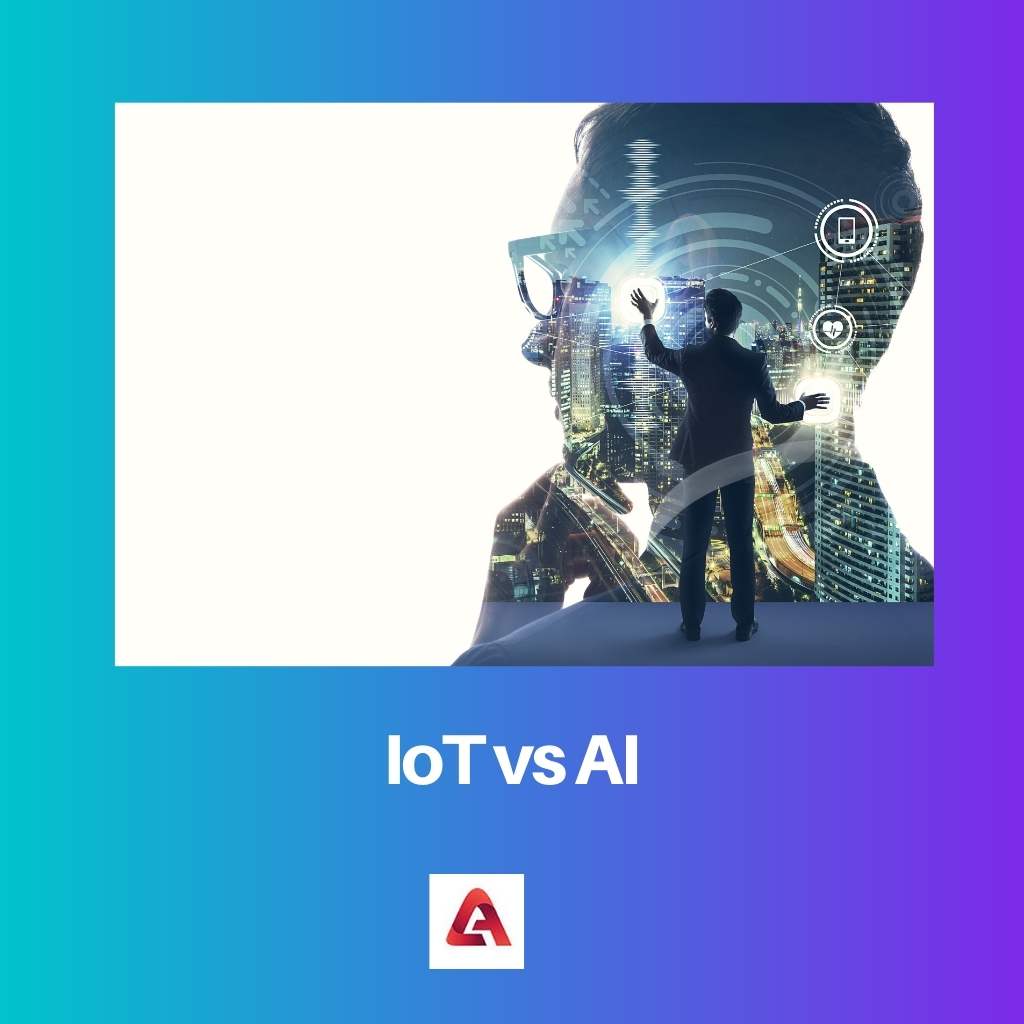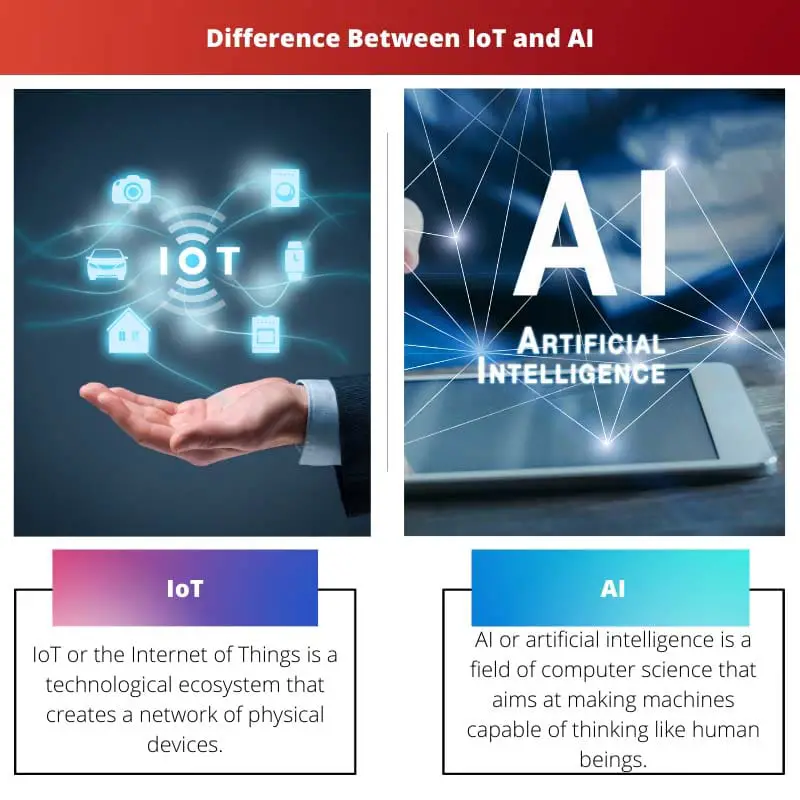Nowadays, more and more people are becoming highly dependent on technology, even for going through their daily lives. Not only has technology influenced the past massively, but it holds a lot of scope in the future as well.
IoT and AI are two such computer technologies that are paving the way for a better world.
Key Takeaways
- IoT involves connecting physical devices to the internet to collect and exchange data, while AI involves using algorithms to enable machines to perform tasks that normally require human intelligence.
- IoT is focused on creating a network of devices, while AI is focused on creating intelligent machines.
- IoT is used for collecting and exchanging data, while AI is used for analyzing data and making predictions.
IoT vs AI
Internet of Things (IoT) refers to a network of connected physical devices that facilitate the collection and exchange of data over the Internet. This technology enables the sharing of real-time data from a variety of devices. Artificial Intelligence (AI) is a technology that simulates human-like intelligence to perform complex tasks. AI makes smart and efficient decisions.

IoT is short for the Internet of Things. This is an ecosystem specifically created with the aim of connecting various physical devices with the help of an internet connection.
Profuse data is shared between two devices that interact with each other on IoT. Here, the devices are built-in with sensors, actuators, and other necessary electronics that are needed.
AI is short for Artificial Intelligence. This is an innovative computer technology that aims at making machines smarter and more efficient. AI machines collect data from past occurrences and learn from them.
They do so by stimulating human behaviour in their systems and thereupon yield an effective output. AI is capable of cognitive thinking.
Comparison Table
| Parameters of Comparison | IoT | AI |
|---|---|---|
| Meaning | IoT is an ecosystem in which various devices connect with each other using the internet. | AI is a computer technology that simulates human behavior to reach an output. |
| Aim | The aim of IoT is to create a better-connected world. | The aim of AI is to make machines smarter and thus more efficient. |
| Depend ence | IoT is highly dependent on AI and does not work without it. | AI is not dependent on IoT by any means. |
| Applications | Applications of IoT include Smart Home, Water Monitoring, Smart Wearables, Smart City, etc. | Applications of AI include Chatbots, Speech Recognition, Machine Vision, Job Adverts, etc. |
| Capabilities | The capability of the device is known beforehand. | The device learns by itself and hence, its capabilities cannot be predicted. |
| Interaction | Human interaction and intervention are necessary for the working of IoT. | AI works independently and does not need any human interaction to function. |
| Cost | IoT is not as expensive as AI. | AI is the latest and fastest-growing technology which makes it quite expensive. |
What is IoT?
IoT, or the Internet of Things, is a technological ecosystem that creates a network of physical devices. These devices are built-in with sensors, actuators, and other necessary software.
Their purpose is to connect with each other to share and exchange data over the internet. Interestingly, IOT can range from small household devices to complex industrial tools.
An easy way of understanding what IoT is is through examples. Lately, IoT is a top contender among other trending technologies. This is because it has the capability of connecting even everyday appliances to the internet.
For example, kitchen appliances, cars, baby monitors, thermostats, etc., all can be connected and instructed to perform certain tasks.
IoT devices are fixed with sensors and other electronics that are affordable and reliable. This proves to be a positive incentive for manufacturers as they can increase their production without burden.
Due to the low cost, it is more accessible to the common man as well.
In the business world, IoT has great value. IoT devices have reached almost every nook and cranny of the marketplace. This allows various companies to capitalize on the business and earn enormous profits.
Not only this, but data-driven insights on IOT can even help businessmen manage their work in a better manner.

What is AI?
AI or artificial intelligence is a field of computer science that aims at making machines capable of thinking like human beings. The machine in question is independent and can learn by itself.
It picks up information from past occurrences and stimulates human behaviour to come up with a certain output.
The credit for the invention of AI can be given to a thought that occurred to the mathematician Alan Turing, which was, “Can machines think?”.
This was the second time that Alan paved the way for a new future after helping encrypt the machine ‘Enigma’ to win World War 2.
Turing wrote “Computing Machinery and Intelligence” in 1950 and subsequently performed numerous tests related to the subject. This helped form a concrete goal and vision of what Alan wanted Artificial Intelligence to become in the coming years.
However, due to the intricacy of the subject, many questions and debates rose to the surface. Interestingly, the subject is disputed so widely that there isn’t even a singular definition of AI that the entire world agrees upon.
Nonetheless, the dynamic nature of AI is more likely to be a boon for all of us. A fact to consider is that the capabilities of AI can never be defined whatsoever.
This is because AI devices are independent learners, and thus, their behaviour and results can never be predicted.

Main Differences Between IoT and AI
- IoT is an ecosystem that connects various devices over the internet, while AI is a computer technology that simulates human behaviour and intelligence.
- The purpose of IoT is to connect the world in a better manner, while AI aims at making machines smarter and more efficient.
- IoT is dependent on AI, while AI is completely independent.
- The capabilities of IoT can be known beforehand, while that of AI is always unpredictable.
- IoT requires human interaction to function, while AI can function self-sufficiently.
- IoT is cheaper than AI.

- https://www.sciencedirect.com/science/article/pii/S0740624X19300905
- https://ieeexplore.ieee.org/abstract/document/8656525/

The historical context and evolution of AI provide valuable insight into the origins and potential of this transformative technology.
The dynamic and ever-evolving nature of AI underscores its potential to redefine conventional paradigms and drive innovation across diverse domains.
Absolutely, the adaptive and progressive nature of AI reflects its capacity to shape the future and revolutionize the technological landscape.
The distinction between IoT and AI is clear and insightful. Understanding the individual capabilities and implications of these technologies is essential for utilizing them effectively.
Indeed, recognizing the unique roles of IoT and AI is crucial for leveraging their potential. It’s essential for individuals and organizations to have a comprehensive understanding of these technologies.
The increase in the integration of technology into our daily lives is both revolutionary and inevitable. This trend reflects the importance of staying up-to-date with the latest technologies available and how they influence our societies and economies
Indeed, technology is becoming a crucial part of our lives. It is essential to understand the impact of these advancements and how they will shape the future.
Agreed. The advancements in IoT and AI hold immense potential for innovation and development across various industries.
The comparison between IoT and AI serves as a valuable resource for understanding their distinct roles and implications, emphasizing the significance of these advancements in technology.
Absolutely, the detailed comparison highlights the unique features and contributions of IoT and AI, shedding light on how they can drive progress and innovation.
The applications of both IoT and AI are vast and diverse, reflecting the potential for technological advancements to revolutionize everyday life.
Absolutely, the wide-ranging applications of IoT and AI present numerous opportunities for innovation and progress across different domains.
Indeed, the versatility of IoT and AI applications showcases the transformative impact of these technologies on various sectors of society.
The emphasis on the capabilities and interactions of IoT and AI provides a comprehensive overview of their impact on various aspects of society.
While the advancements in IoT and AI are impressive, there are also concerns regarding privacy, security, and ethical implications that need to be addressed.
You’re absolutely right. As we move towards a more interconnected world, it’s crucial to consider the ethical and security challenges that come with these technological developments.